KRONECKER LIMIT FUNCTIONS AND AN EXTENSION OF THE ROHRLICH–JENSEN FORMULA
IF 0.8
2区 数学
Q2 MATHEMATICS
引用次数: 1
Abstract
In [20], Rohrlich proved a modular analog of Jensen’s formula. Under certain conditions, the Rohrlich–Jensen formula expresses an integral of the log-norm $\log \Vert f \Vert $ of a ${\mathrm {PSL}}(2,{\mathbb {Z}})$ modular form f in terms of the Dedekind Delta function evaluated at the divisor of f. In [2], the authors re-interpreted the Rohrlich–Jensen formula as evaluating a regularized inner product of $\log \Vert f \Vert $ and extended the result to compute a regularized inner product of $\log \Vert f \Vert $ with what amounts to powers of the Hauptmodul of $\mathrm {PSL}(2,{\mathbb {Z}})$ . In the present article, we revisit the Rohrlich–Jensen formula and prove that in the case of any Fuchsian group of the first kind with one cusp it can be viewed as a regularized inner product of special values of two Poincaré series, one of which is the Niebur–Poincaré series and the other is the resolvent kernel of the Laplacian. The regularized inner product can be seen as a type of Maass–Selberg relation. In this form, we develop a Rohrlich–Jensen formula associated with any Fuchsian group $\Gamma $ of the first kind with one cusp by employing a type of Kronecker limit formula associated with the resolvent kernel. We present two examples of our main result: First, when $\Gamma $ is the full modular group ${\mathrm {PSL}}(2,{\mathbb {Z}})$ , thus reproving the theorems from [2]; and second when $\Gamma $ is an Atkin–Lehner group $\Gamma _{0}(N)^+$ , where explicit computations of inner products are given for certain levels N when the quotient space $\overline {\Gamma _{0}(N)^+}\backslash \mathbb {H}$ has genus zero, one, and two.Kronecker极限函数和rohrlich-jensen公式的推广
在[20]中,Rohrlich证明了Jensen公式的模模拟。在某些条件下,Rohrlich–Jensen公式根据在f的除数处评估的Dedekind-Delta函数来表示${\mathrm{PSL}}(2,{\mathbb{Z}})$模形式f的对数范数$\log\Vertf\Vert$的积分。在[2]中,作者将Rohrlich–Jensen公式重新解释为评估$\log\Vert f\Vert$的正则内积,并将结果扩展到计算$\log\Wert f\Vert$的正则化内积,其等于$\mathrm{PSL}(2,{\mathbb{Z}})$的Hauptmodum的幂。在本文中,我们重新审视了Rohrlich–Jensen公式,并证明了在任何具有一个尖点的第一类Fuchsian群的情况下,它可以被视为两个庞加莱级数的特殊值的正则内积,其中一个是Niebur–Poincaré级数,另一个是拉普拉斯算子的预分解核。正则内积可以看作是马-塞尔伯格关系的一种。在这种形式中,我们通过使用与预解核相关的一类Kronecker极限公式,发展了与任何具有一个尖点的第一类Fuchsian群$\Gamma$相关的Rohrlich–Jensen公式。我们给出了两个主要结果的例子:首先,当$\Gamma$是全模群${\mathrm{PSL}}(2,{\mathbb{Z}})$时,从而重新提出了[2]中的定理;第二,当$\Gamma$是Atkin–Lehner群$\Gamma_{0}(N)^+$时,其中当商空间$\overline{\Gamma_{0}(N)^+}\反斜杠\mathbb{H}$具有亏格0、1和2时,对某些级别N给出内积的显式计算。
本文章由计算机程序翻译,如有差异,请以英文原文为准。
求助全文
约1分钟内获得全文
求助全文
来源期刊
CiteScore
1.60
自引率
0.00%
发文量
31
审稿时长
6 months
期刊介绍:
The Nagoya Mathematical Journal is published quarterly. Since its formation in 1950 by a group led by Tadashi Nakayama, the journal has endeavoured to publish original research papers of the highest quality and of general interest, covering a broad range of pure mathematics. The journal is owned by Foundation Nagoya Mathematical Journal, which uses the proceeds from the journal to support mathematics worldwide.

 求助内容:
求助内容: 应助结果提醒方式:
应助结果提醒方式:


